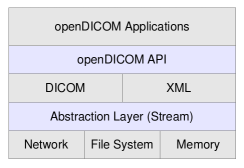About
 The openDICOM.NET project implements a new approach towards
DICOM
(Digital Imaging and Communications in Medicine) libraries.
DICOM is a worldwide standard in Health IT and is provided by
the National Electrical Manufacturers Assocation (NEMA). This
standard specifies the way medical images and meta data like
study or patient related data is stored and communicated over
different digital medias. Thus, DICOM is a binary protocol and
data format.
The openDICOM.NET project implements a new approach towards
DICOM
(Digital Imaging and Communications in Medicine) libraries.
DICOM is a worldwide standard in Health IT and is provided by
the National Electrical Manufacturers Assocation (NEMA). This
standard specifies the way medical images and meta data like
study or patient related data is stored and communicated over
different digital medias. Thus, DICOM is a binary protocol and
data format.The opendicom-sharp class libary, main part of the project, provides an API to DICOM in C# for Mono and the .NET Framework. It is a completely new implementation of DICOM. In contrast to other similar libraries the intention of this implementation is to provide a clean classification with support of unidirectional DICOM data streaming. Another implemented goal is the support of DICOM as XML. This is not standard conform but very use- and powerful within software development, storage and manipulation. The entire DICOM content can be accessed as sequence or as tree of class instances. Latter is the default representation of DICOM content by the library.
opendicom-utils is a collection of console tools for working with required data dictionaries in different data formats (binary and textual), querying of ACR-NEMA (prior DICOM standard) and DICOM files and transcoding them into image formats like JPEG or XML files. These tools are written in C# for Mono and the .NET Framework and are using the opendicom-sharp API for processing.
opendicom-navigator recapitulates opendicom-utils in form of a GTK GUI. It provides different views with focus on DICOM data sets and visualization. Connectivity to GIMP is also provided for single image processing purpose as well as the possibility to run through multi-frame or tomographic images like a movie.
The openDICOM.NET Beagle Filter Plugin, opendicom-beagle, helps to keep track of distributed ACR-NEMA and DICOM files across the file system. The filter plugin makes DICOM content indexable for retrieval. The Beagle search engine relies on Mono/.NET and works in the background of your system, but is able to detect content changes in realtime (depending on your configuration).


